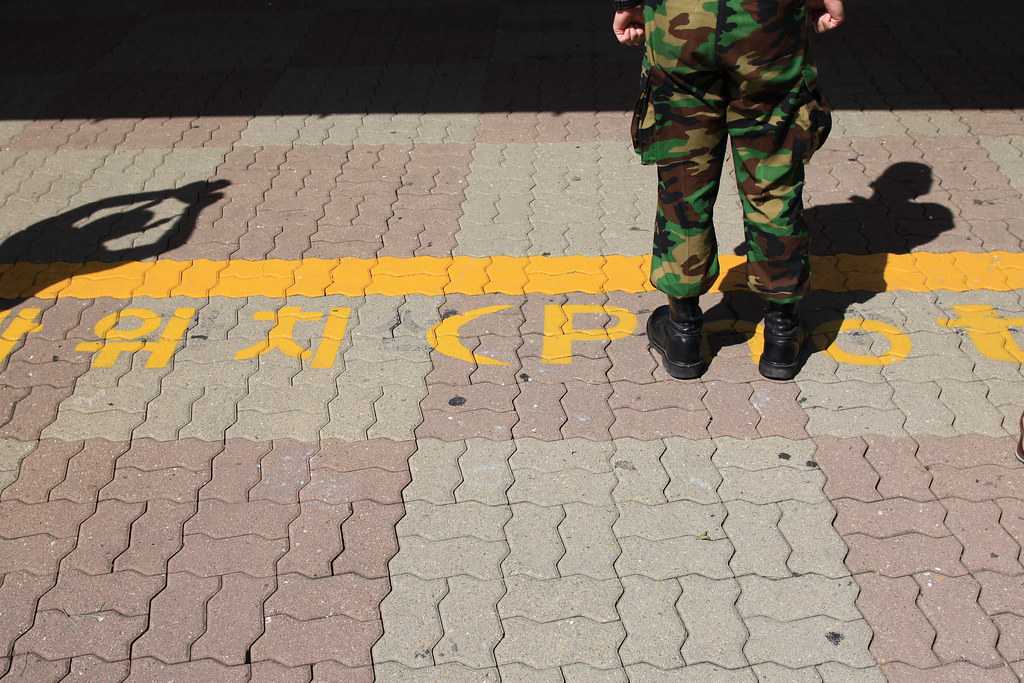On 23 June 2017, the Elcano Royal Institute for International and Strategic Studies hosted the seminar ‘Peace and Stability in the Korean Peninsula’, which gathered experts from the two Koreas, the US, China, Russia, Germany, France, the UK, Italy, Poland and Spain.* In a context of mounting tension in the Korean Peninsula, the seminar’s aim was to bring together experts from all the concerned parties and top European think-tanks to discuss and present ideas on how to promote peace, stability and prosperity in the Korean Peninsula.
It is evident that the Korean Peninsula is immersed in a dangerous dynamic, since the danger of war, although scant, is growing as the Democratic People’s Republic of Korea (DPRK) comes ever closer to arming intercontinental ballistic missiles with nuclear warheads. The closer Pyongyang’s ability to hit the US Pacific Coast becomes, the greater the threat perceived by the American public and therefore the pressure on Donald Trump to take decisive action to counter it. The death of a US citizen, Otto Warmbier, some days after being released in a coma from North Korean detention further broadened the rift between Washington and Seoul.
“The most realistic option to face the DPRK nuclear crisis is to reopen a process of political dialogue”
The challenge to the non-proliferation regime posed by the North Korean nuclear and missile programmes should not be tackled resorting to armed intervention given the dubious efficacy of such an option and the exorbitant risk it would entail. Neither can international sanctions be the solution since to be successful they would have to be reinforced by China in a way that would trigger a humanitarian crisis in North Korea, a massive flow of refugees towards Chinese territory and, above all, jettisoning the policy of non-interference regarding Pyongyang. Hence, the most realistic option to face the DPRK nuclear crisis is to reopen a process of political dialogue.
Despite the obvious differences between the two situations, the Iran nuclear deal could provide some meaningful inspiration for political dialogue, since both are cases of profound mistrust between the parties involved and the prospects of an agreement very thin. Political dialogue regarding the DPRK nuclear programme does not have to be public but should combine bilateral (Washington-Pyongyang) and multilateral tracks (involving the Six-Party Talks countries and the EU). The governments of Japan and the US are the most reluctant to follow a diplomatic course but at the same time are the most sensitive to their public opinions if the measures taken are not the right ones. Therefore, there is now an opportunity to attempt to settle the issue by diplomatic means.
“In the absence of substantial diplomatic engagement, the DPRK would be able to hit the US mainland with a nuclear bomb by 2020”
There is some urgency in beginning to negotiate since the two windows of opportunity that are now open will close in two-to-three years if events continue to unfold as they have done so far. The first is preventing the DPRK from becoming a fully-fledged nuclear power capable of miniaturising nuclear warheads and delivering them in intercontinental ballistic missiles. Taking advantage of this opportunity would be beneficial to US and regional security and would limit the damage to the non-proliferation regime. The second window of opportunity concerns the applicability of the byungjin line, which advocates the parallel pursuit of nuclear weapons and economic development and has a prominent place on the North Korean government’s agenda. In the absence of substantial diplomatic engagement, the DPRK would be able to hit the US mainland with a nuclear bomb by 2020, although the country already has a sufficient nuclear deterrent to prevent foreign intervention on its territory and going the extra mile would be at the expense of enduring stifling economic sanctions that would dramatically hinder its economic development.
However, many decision-makers of the parties concerned have failed to perceive these opportunities. In the US and other OECD countries there are still many experts who either consider it possible to make Pyongyang completely forsake its nuclear programme or who prefer not having a deal rather than striking one short of securing the DPRK’s complete denuclearisation. The North Korean mainstream view is that it is necessary to become a fully-fledged nuclear power as soon as possible, since only that level of nuclear deterrence can prevent foreign intervention. In their eyes, the regime will not be safe until then.
To continue to impose the requirement of a complete dismantling of the DPRK nuclear programme as a precondition for negotiations is impossible as it is already part of the regime’s identity and sense of legitimacy. Furthermore, it would raise the cost of any regime change attempt from the outside and no external security guarantees can compensate Pyongyang for the loss of its nuclear deterrence. Therefore, no agreement requiring the denuclearisation of North Korea can be achieved, certainly not in the short term.
“The best and most plausible scenario would be the opening up of negotiations based on a North Korean moratorium on nuclear and missile tests”
The best and most plausible scenario would be the opening up of negotiations based on a North Korean moratorium on nuclear and missile tests. The Republic of Korea (ROK), China and Russia support this position. The new Moon Jae-in government has provided a renewed impetus to this option as it is much more favourable than the two previous South Korean governments to intensify its relations with Pyongyang, even if this requires a reduction in the scale of US-ROK joint military exercises. China has proposed a ‘dual-freeze’, involving a halt to military exercises between South Korea and the US in exchange for a moratorium on Pyongyang’s nuclear and missile tests. This option has been rejected by Washington because it considers that an activity that contravenes international law (nuclear and missile tests) cannot be equated with another that respects it (joint military exercises). A reduction and/or transformation of ROK-US military manoeuvres would be more palatable to Washington, although any US compromise with Pyongyang would demand a skilful communication strategy. In exchange for security guarantees, including a pending peace treaty, a reduction in certain military exercises and an end to international sanctions, Washington could secure the freezing and verification of North Korea’s nuclear and missile programmes, the release of US prisoners in North Korea and a de-escalation in the Korean Peninsula and North-East Asia. US military compromises would also be welcome in Moscow and Beijing for strategic reasons of their own.
Regarding the role of Europe, the European Commission and/or some EU member states could play a mediating role or, at least, facilitate negotiations, multilateralising any agreements between Washington and Pyongyang (on proliferation) or between Seoul and Pyongyang (on unification-reunification).
Summing up, the clock is ticking and the players involved have a momentary opportunity to seek a negotiated solution that would benefit all before the DPRK becomes a fully-fledged nuclear power with the consequent negative impact on international security and North Korea’s socio-economic prospects.
* This comment summarises the main conclusions to be drawn from the seminar but does not necessarily represent the views of all the participants.
The full list of participants is as follows: Alexander Zhebin (Russian Academy of Sciences), Bartosz Wisniewski (Polish Institute of International Affairs), Charles Powell (Elcano Royal Institute), Choe Sin (Disarmament and Peace Institute), Eric Ballbach (Free University of Berlin), Felix Arteaga (Elcano Royal Institute), Fernando Alonso Navaridas (Spanish Ministry of Foreign Affairs), Françoise Nicolas (French Institute of International Relations), John Nilsson-Wright (Chatham House), Jong Tae Yong (Disarmament and Peace Institute), Ju Gwang Hwa (Disarmament and Peace Institute), Liu Qing (China Institute for International Studies), Mario Esteban (Elcano Royal Institute), Mira Milosevich (Elcano Royal Institute), Nicola Casarini (Institute of International Affairs), Rafael Estrella (Elcano Royal Institute), Scott Snyder (Council on Foreign Relations) and Shin Beomchul (Institute of Foreign Affairs and National Security).




